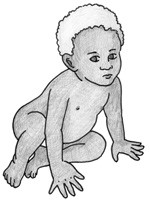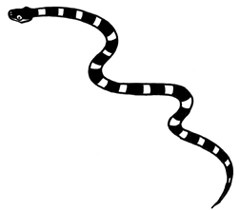
‘a child’
M - m
maji [matɕi] ni. leg's calf; mollet.
▪ maji-na ‘his calves’.
► See: sari ‘leg, foot’.
majo [maʧo] vi. enter, go inside, penetrate; entrer, rentrer, pénétrer.
▪ Mo majo lo v̈apa. ‘He enters the cave.’ ‘Il entre dans la grotte.’
▪ Hariv mo sihir̄i mo sa mo majo lo hurar̄a. ‘The rat ran back into the deep of the forest.’ ‘Le rat courut regagner la forêt profonde.’
► Ant: m̈alue.
majuru [maʧuɾu] vi. torn; to break, split (intr.); déchiré, se déchirer, se briser, se fendre.
▪ M̈ala mo var̄i-a p̈isu-na mo huren-i-a mo sivo lo hap̈asi via, mo majuru. ‘With its huge claws, the hawk seized the taro stem and tore it to pieces. [lit. and it was torn]’. ‘De ses grandes serres, le faucon saisit la tige de taro, et la déchira complètement.’
malá [maˈla] n. Incubator Bird, a dark coloured bird similar to fowl; Mégapode, sorte de poule sauvage au plumage noir. Megapodius freycinet.
◈ Etym. *mwalau ‘Megapode’.
malarin [malaɾin] n. mandarin; mandarin, a recently introduced fruit. Citrus nobilis.
◈ Borrowed from mandarin.
maluhu [maluhu] vt. roll, roll up; enrouler.
maluhu naho~ n. wrinkles; les rides.
mani [mani] ni. ~ man. vein, nerve; veine, nerf.
▪ mani-ku ‘my veins’. ‘mes veines’.
▪ man variri ‘little veins’. ‘petites veines’.
▪ man v̈alalap̈a ‘large veins’. ‘grandes veines’.
► See: jai ‘blood’.
maniok [maniok] n. manioc; manioc. Manihot esculenta. Despite being introduced, this tuber is widely cultivated, along with yam (jam) and taro (per̄a).
manometo [manometo] n. kind of pigeon; sorte de pigeon.
► See: huep̈e.
1 • Vanuatu Mountain Pigeon, Bisl. Nawemba blong hil; Carpophage de Baker, Nautou des montagnes: sorte de pigeon (Bisl. Nawemba blong hil). Ducula bakeri.
2 • or maybe: White-throated Pigeon, Metallic Wood Pigeon; ou bien: Pigeon à Gorge blanche, Collier blanc. Columba vitiensis.
► Syn: r̄oro.
mape [mape] ni. liver; foie.
► See: mavusa ‘heart’ ‘cœur’.
◈ Etym. *mwabwe ‘Inocarpus chestnut; liver’.
 |
| mara hetehete ‘a child’ |
mara [maɾa] art. 1 • [+adjective 'small' hetehete (sg) ~ variri (pl)] a small one: a child; celui, celle. Article personnel, permettant de substantiver certains adjectifs, référant à des humains: cf. angl. "the (big) one".
▪ mara hetehete mo hese ‘a child [a small one]’. ‘un enfant [un petit]’.
▪ mara variri ‘children’. ‘les enfants’. The word mara (orig. "child") cannot appear on its own, but needs an adjective; hence it may be reinterpreted as a substantiviser (see second use below).
2 • the people of (+ place name): refers to the inhabitants of a place; les gens de (+ toponyme): désigne les habitants d'un endroit.
▪ Mara Naur̄a-lap̈a mo sivosivo velu r̄o kia. ‘The people from Santo went there to dance.’ ‘Les gens de la Grande Île (Santo) s'y rendaient pour y danser.’
▪ Mara Tanna hase-ra, nira mo levse han-i-a viri. ‘Only the people from/on Tanna are used to eating dogs.’ ‘Seuls les habitants de Tanna ont l'habitude de manger du chien.’
► See: rai.
◈ Etym. mara ʀoma ‘the Romans’; *mwera ‘child, person-of’.
 |
| mar̄a r̄as ‘sea snake’ |
mar̄a [mara] n. snake; serpent.
▪ Mar̄a mo hese mo haj-i-á! ‘I got bitten by a snake!’
mar̄a r̄as n. Sea-snake: a black and white, very dangerous snake living in the sea; Tricot-rayé, serpent marin caractérisé par ses rayures noires et blanches. Laticauda semifasciata.
◈ Etym. *mwata ‘snake’.
mar̄ahuavi [marahuaβi] n. Rufous-brown Pheasant-Dove, 31 cm; Colombe à Longue queue, 31 cm. Macropygia mackinlayi.
masmasu [masmasu] ni. sweat, perspiration; sueur.
◆ vi. sweat, perspire; transpirer.
mavuhi [maβuhi] ni. [plant: bamboo+] knot, joint, fig. joint in the body; nœud (bambou, canne), jointure.
▪ mavuhi lim̈a-ku ‘[my hand-joint] my wrist’. ‘[lt. le nœud de ma main] mon poignet’.
mavusa [maβusa] ni. ~ mavsa.
1 • innards, guts; entrailles, viscères.
▪ r̄anga mavsa-na ‘his innards [his "gut-bag"]’.
► Syn: r̄ali.
► See: pange ‘bell’ ‘ventre’; mape ‘liver’ ‘foie’.
2 • heart; le cœur.
mavusa salesale ni. lungs; poumon.
▪ mavusa salesale-ku ‘my lungs’.
◈ Etym. *vuso ‘heart’.
meje [metɕe] vi. [Subj: thanked person] to be thanked, mainly in thanking phrase om meje "Thank you [You are thanked]"; [Suj: personne remerciée] être remerciée, princip. dans la formule de remerciement om meje "Merci à toi [Tu es remercié]".
▪ Ham meje. ‘Thank you (pl).’ ‘Merci à vous.’
▪ Om meje lap̈a m̈ar̄a no-m v̈ev̈ehina lo sorosoro m̈ar̄a-n Raki. ‘Thank you (sg) so much for your work on Araki language.’
▪ Nia mo meje. ‘Thank him!’ ‘Merci à lui.’
◆ n. thanks, acknowledgment; merci, remerciement.
▪ Kam soro meje lap̈a m̈ar̄a nunu om var̄i-a. ‘We thank you very much for taking this photo. [we say a big thanks]’. ‘Nous te disons un grand merci pour cette photo que tu as prise.’
mejo [meʧo] vi. [food, meal] cooked, well done; [nourriture, plat] cuit.
▪ Junga-ku ureeje mo r̄e mejo mo iso. ‘My piece of pudding is already done.’ ‘Mon morceau de laplap est déjà cuit.’
► See: m̈ena ‘ripe’.
◈ Etym. *maso-so ‘cooked, done’.
meresai [meɾesai] vi. [Subj. plural] be enemies, hate each other; ennemi.
▪ Hariv nira-n huir̄a mo meresai. ‘The rat and the octopus are enemies.’ ‘Le rat et la pieuvre sont des ennemis.’
► See: r̄ap̈ala~ ‘friends’.
mle [mle] vi. ~ mule. 1 • go or come back, esp. return home; rentrer; regagner (sa maison...).
▪ Mo rovo mo mle mo sa lo ima. ‘He fled without further ado, running back up home.’ ‘Il prit ses jambes à son cou et courut rentrer chez lui.’
▪ Na, ta jo mule na pa varai-a nia. ‘As for me, when dad comes back, I will tell him everything!’ ‘Moi, quand papa rentrera j'irai tout lui dire!’
2 • go away, leave a place; partir, s'en aller, quitter un lieu.
▪ Om re se mo poi-ko? O mle! ‘But who do you think loves you? Go away!’ ‘Mais de qui penses-tu être aimé ? Va-t-en !’
◆ dir. over (there). Directional, sometimes combined with a second Directional v̈a / v̈ano; là-bas, au loin. Directionnel; souvent combiné à un second directionnel v̈a / v̈ano.
▪ P̈ir̄a mo hese mo r̄oho r̄av̈al jingo mle v̈a. ‘There was a woman who lived over there on the other side of the cape.’ ‘Il y avait une femme qui habitait de l'autre côté du cap, là-bas.’
◈ Etym. *mule ‘return’.
mo [mo] pps. he, she, they: 3rd person (sg / pl) Subject personal pronoun, associated to Realis mood; il(s), elle(s): pronom personnel sujet 3ème personne singulier et pluriel, associé au mode Realis.
▪ Mo usa, turusi-na mo jovi mo sivo mo r̄kel-i-a r̄aju mo hese mo rojo mo m̈ar̄e. ‘One rainy day, a drop of (stagnant) water dripped on to a man, who fell sick and died.’ ‘Un jour qu'il pleuvait, une goutte (d'eau stagnante) tomba sur un homme, et il en tomba malade à en mourir.’
mohi [mohi] n. mosquito; moustique.
▪ Mohi mo vutiana! ‘There are a lot of mosquitoes’. ‘Il y a beaucoup de moustiques !’
▪ Mohi mo levse har̄i-a r̄aju. ‘Mosquitoes bite [know how to bite people]’. ‘Les moustiques, ça pique [savent mordre les hommes]’.
◈ Etym. *namu-ki (?); *ñamuk.
moli1 [moli] n. ~ mol. orange; orange. Citrus sinensis.
mol hohono n. Citrus aurantium. "wild orange", name for lemon or lime; "orange sauvage", nom du citron.
◈ Etym. *moli ‘Citrus’; *molis.
moli2 [moli] n. chief, community leader; chef.
▪ Vi-p̈aka mo re nko pa moli, niko pa r̄aju lap̈a. ‘The banyan means that you will become a chief, an important person.’ ‘Le banian est signe que tu seras chef, que tu seras un homme important.’
▪ Moli mo r̄oho r̄o v̈e? — Nia mo v̈a lo ham̈ali. ‘Where is the chief? — He went to the men's house.’ ‘Où se trouve le chef? — Il est (allé) au nakamal.’
► See: r̄aju lap̈a.
monohi [monohi] ni. brain; cerveau.
▪ Niko mo je r̄e monohi-m! ‘You have no brain! (you are silly)’. ‘Tu n'as pas de tête ! tu es bête !’
► See: levosai ‘clever’.
mor̄u [moru] vi. small, narrow. Only in one archaic expression, found in the tale of the Rat and the Octopus; petit, étroit. Uniquement dans une expression archaïque, conservée dans le conte du Rat et du Poulpe.
▪ Aka-ku mo mor̄u. ‘Too narrow is my boat!’ ‘Ma pirogue est minuscule (il n'y a plus de place)’.
► See: hetehete ‘small’.
muhu [muhu] n. earthquake; séisme.
◈ Etym. *muki.
mule [mule] vi. complete form of mle; forme non syncopée de mle.
muru [muɾu] adj. 1 • first (in order); premier.
▪ naivou-ku muru ‘my first wife’. ‘ma première femme’.
▪ voro-muru ‘firstborn, eldest child (Cf. voro)’. ‘premier né, aîné (Cf. voro)’.
► See: ha-6 ‘ordinal prefix’.
2 • last, the most recent in time; dernier, le plus récent en remontant dans le temps.
▪ Lo Kr̄ismas muru mo je usa. ‘Last Christmas [lit. first Chr.] it didn't rain.’ ‘Au Noël dernier [lt. premier Noël], il n'a pas plu.’